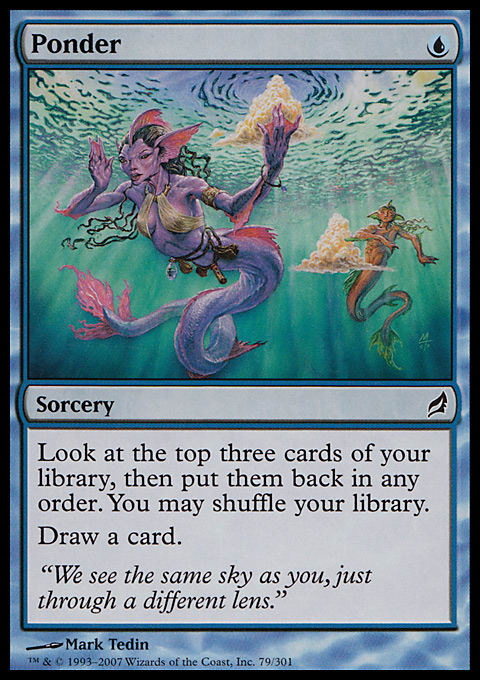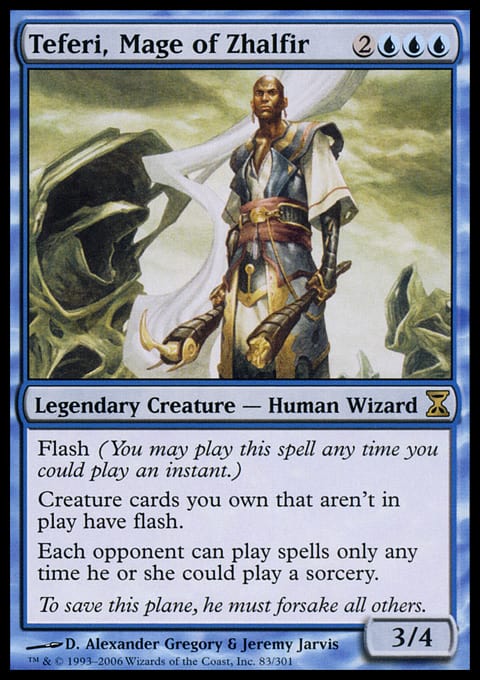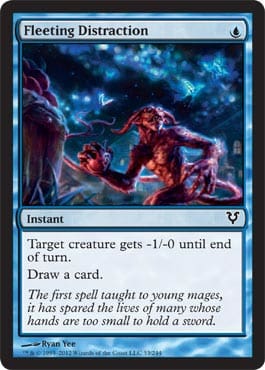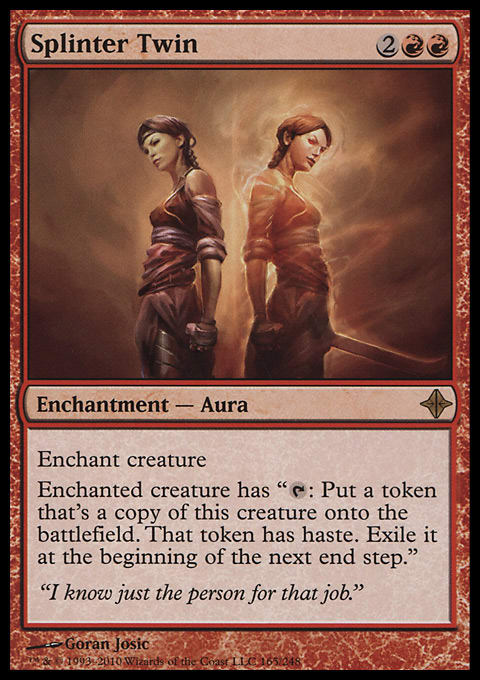Do you use Magic Online to practice for live tournaments?
Your practice might not be as effective as you think it is.
I've come to realize that, although Magic Online is one of the best tools you can use to prepare for tournaments (perhaps the best), there is a good chance that many people’s Magic Online preparation is lacking, and I'd like to discuss why I think that is and what steps you can take to improve your online preparation.
The main idea is that there are a lot of differences between Magic Online and live play. Some of these are obvious, and some of these will sound obvious after you’ve read them, but it would be to your advantage to keep all of them in mind so your results (online or otherwise) don’t suffer.
Booster Drafting
If you do a lot of drafting both online and in person, the first thing you’ll notice is that Magic Online not only lets you look at all your picks while you draft, but also lets you sort them by things like converted mana cost or color, and it lets you preemptively move cards to your sideboard. This is a really convenient feature that’s in place mostly because it’s impossible to police you if you want to write down your picks or take screenshots, so they may as well help you out. What this means for your Draft game is that, online, you’ll usually have a bit more luxury in considering each pick and how strong it is relative to your existing cards—you have easier access to information.
In premier-event level Booster Drafts, you aren’t allowed to look at your picks in the middle of the pack—you only have a short review period in between each pack. You are also usually asked to keep all your picks in one face-down pile. Drafts with your friends at home or at your local game store might be more relaxed and let you look at your picks before making each pick, but you’re still often asked to keep them in a single, face-down pile.
The result is that practicing Draft on MTGO can cause you to grow used to the comfort of knowing exactly how your deck looks as you make each pick. Moving to a live Draft afterward can cause you to make picks without considering things like where a certain card fits on your mana curve, what synergies a card might or might not have with your existing picks, or even what colors you are drafting. One mistake I find myself making from time to time is starting a Draft with a green card (for example), taking a really strong red card second pick, and then picking green cards in picks three through seven with the mindset that I’m drafting R/G. The reality is that I might not be seeing red cards or that I might be seeing white or black cards flowing, and it’s correct for me to jump into one of those colors.
The best solution, other than just pure memory training, is to take advantage of your review period to the fullest. Immediately sort your cards by curve to identify gaps that you need to fill, and identify sideboard cards and cards that you don’t plan on using, and shift them to the back. Another trick you can use to avoid the one-pile restriction is to orient cards in both directions—put cards you don’t plan on using upside down so you can quickly move them to the back during your review period. If you’re feeling frisky, you can try joining a Draft on MTGO and covering your Draft picks with a sheet of paper or something to try improving your memory in a Draft, but this is a bit extreme—you can generally conquer the differences between MTGO Drafts and in-person Drafts pretty easily as long as you are mindful of them.
Rules Assistance
Magic Online is the best judge there is: It knows all the rules and implements them perfectly (save for the occasional bug). It always pops your triggers up for you and makes sure you’re clear about whether you want to use optional ones, and as long as your stops are set correctly, it lets you act in whatever phase of the game you want to act in. It absolutely won’t let you cast a card that you don’t have enough mana to cast, it always shuffles as randomly as computers allow, and there’s no way to look at or draw extra cards online, accidental or otherwise (please don’t cheat). In addition to that, MTGO always de-sideboards for you after every match.
In paper Magic, you (and to some degree your opponent) are responsible for taking all of your actions properly. Missing triggers is probably the biggest pitfall, but poor communication, unclear shortcuts, and failure to de-sideboard are probably not far behind.
Try to know exactly what triggers your deck is capable of producing beforehand, and use a reminder if you think you might be prone to forget it. You’ve probably seen a die or counter or marker on top of a deck as a useful tool for remembering upkeep triggers—if not, start making use of it if you need help remembering your triggers. Announce all of your modes and targets clearly, and make sure your opponent understands exactly what you’re trying to do with your cards. Always try to de-sideboard immediately after a match is over, and always count your deck facing you before you shuffle and present for a new match so you can give yourself one more chance to spot any leftover sideboard cards. (This is also helpful in making sure you don’t present thirty-nine or fifty-nine cards, another thing you never have to worry about online.) If you are forgetful with regard to de-sideboarding, one trick you can use is to keep your sideboard unsleeved and keep extra empty sleeves for it. When you ’board a card in, sleeve it, but don’t unsleeve the cards you are ’boarding out. This way, at the beginning of your next match when you count your deck and your sideboard (which you hopefully do every time), a few sideboard cards in sleeves should remind you to de-sideboard.
Pace of Play
On Magic Online, each player has a time bank (usually twenty-five minutes) to take all of his or her game actions, so as long as players complete their matches within that amount of time, they aren’t penalized for slow play. It doesn’t work like that in paper Magic—each player is expected to make plays in a timely fashion, and it’s up to them to keep up a reasonable pace of gameplay.
Advice on how to play faster in paper Magic is perhaps outside the scope of this article, and in fact, there have been many good articles written about this topic both in general and specific to certain formats or archetypes. Some things to keep in mind, though, are to develop crisp, brisk physical movements for things like laying your board out, tapping and untapping your permanents, drawing cards, and shuffling. Make use of in-game shortcuts, such as using fetch lands or shuffling your deck during your opponent’s turn while your opponent is thinking about a play or a combat step. If you like to pile shuffle, learn how to do it quickly, and practice your technique outside of tournaments. Don’t spend too much time shuffling your deck or your opponent’s (but on the flip side, make sure you sufficiently randomize it). Five or six proper riffle shuffles is mathematically sufficient randomization for decks of around forty cards, and seven is sufficient for decks of around sixty card. The main idea is that when you are using Magic Online to practice for live tournaments, keep in mind that the difference in time that it takes to perform mechanical game actions online and in person is definitely not negligible.
Distractions
Perhaps the biggest unseen difference between playing online and playing in person is the number of distractions. When you have a live opponent in front of you, chances are pretty good that you are focused only on that player and the game in front of you. You aren’t allowed to use electronic devices in tournaments, so you can’t do things like text or surf the Internet when it’s not your turn.
Online, however, is a different story. Magic is often just one window on your desktop out of many: various social-media websites and chat programs, Internet pages with decklists and strategy, other games of Magic, other games altogether, and so on. I am fairly confident that the vast majority of Magic Online players are not giving their full attention to their matches. These distractions result in poor gameplay—losing focus on a particular game plan for a game or match, not tracking information as effectively as possible, neglecting to consider future possibilities such as draw steps or opponents’ potential holdings, and the list goes on.
The solution to this one is the easiest (or perhaps hardest) to implement. Every time you play a game on Magic Online, take it seriously. Pretend it’s an in-person tournament. Shut off all distractions, close all your other tabs and windows, and focus only on the game at hand. Only play one match at a time (this is also courteous to your opponents). It’s very tempting to open up a browser and surf the Internet while your opponent is taking a long time on a play (or perhaps playing another match, which is discourteous and not conducive to improving your gameplay), but try to sit and focus and use that time to think about the game and how the next few turns are going to play out. Think a lot more in general while you play—take enough time in between plays to consider your options and make sure you are confident in your choices.
Metagame
If you practice online to prepare for live tournaments, you might be surprised at how different the metagames usually are. In general, Constructed metagames on Magic Online are a bit faster and tend to be more inbred than in real life. If Splinter Twin wins a major live tournament one week, the Modern events online are already adapting to it and it might quickly go from “the deck to beat” to “the deck that’s already being beaten.”
There isn’t so much a “solution” to this; it’s more like something to be very mindful of. Weekly tournaments at Friday Night Magic and local game stores are more likely to be populated with the same group of players playing the decks they like the most and have access to, so don’t be surprised if you try your deck online and the metagame is more hostile for it than it is at your local tournaments. On the flip side, if you’re tracking the online metagame very well, don’t be surprised if you find that your deck is too fancy or inbred for a lagging local metagame. In general, MTGO is best used as a tool to see how your deck functions against a real opponent and to learn all of its intricacies, rather than an as assessment of how good your deck is in the metagame at large—predicting the metagame at large is tough to do and can’t be done simply by looking at one tournament in one location (online or in person).
Incentive
Many people who play online for free are just playing for fun or to test out a deck idea without risking anything. If you’re playing for free in the practice rooms, your results can be skewed—I believe you are more likely to win if your opponents don’t have anything invested in the match (such as event tickets or online boosters) since they will simply care about it less. Practice matches are also more likely to be testing grounds for unproven deck ideas, and those decks might not have as much polish on them yet. Don’t be caught off guard if you’re having a lot of success in free practice matches—the competition will probably be tougher if the stakes are higher. It generally holds that the more you are playing for, the more serious the competition will be.
Practicing online is a fantastic tool for any competitive Magic player, but remember to keep in mind that just putting in mindless volume won’t always help you improve. The best players in Magic (and any other game, really) are constantly looking for weak spots in their games and trying to strengthen them, and I’ve tried to identify as many as I can that exist for people who get a lot of their practice online.
Thanks for reading.



























